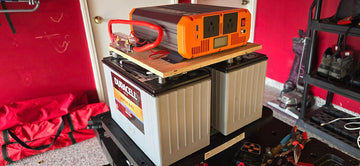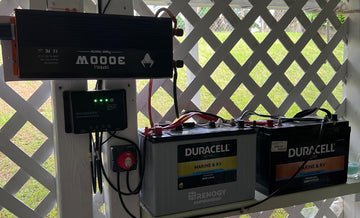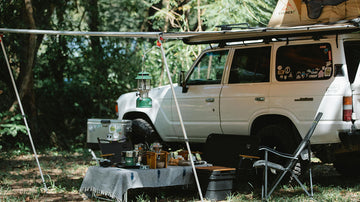For those who enjoy overlanding, there is an increasing need for electrical devices to provide power. Setting up an effective solar system for overlanding is a great way to enjoy your adventures. Installing solar panels won't be a long process once you've read this guide. Everyone agrees that installing solar panels for cars is a tough job. To make the process easier, we've outlined detailed steps for overland solar setup.
How to solar power your overland journey
When it comes to setting up an overland solar system, four main components are essential to consider. These components include solar panels, charge controllers, batteries, and inverters. Each component plays a vital role in the overall functioning of the solar system.
Solar panels
A solar panel is the backbone of any solar energy system. It usually consists of multiple solar cells that capture the sun's rays and convert them into electricity. There are three main types of solar panels commonly used in overland solar setups: polycrystalline, monocrystalline, and thin film. Solar panels installed on vehicles are usually flexible or semi-flexible to fit the curves and shapes of the vehicle's surface.
Polycrystalline panels are the least costly and are suitable for people on a limited budget. However, monocrystalline panels are more efficient than polycrystalline panels, providing higher energy output, and are an excellent choice for people with limited space. However, monocrystalline solar cells are expensive to produce due to their delicate manufacturing process and are relatively expensive.
Thin-film panels are the lightest and most flexible option. Thin-film solar cells generally have lower conversion efficiencies than silicon-based solar cells, but their flexibility and light weight give them an advantage in certain specific scenarios. For example, they can be easily mounted on curved surfaces in mobile devices and outdoor equipment.
Solar charge controller
Charge controllers are devices used to manage and control the battery charging process. Their functions include monitoring battery condition, regulating charge current and voltage, ensuring safe battery charging, and extending battery life. They prevent overcharging and ensure efficient battery charging. There are two main types of charge controllers: PWM and MPPT.
PWM charge controllers are the most affordable option for small solar systems of 300 watts or less, while MPPT charge controllers are more efficient than PWM controllers and are an excellent choice for larger solar systems. If your system is larger than 800 watts, you'll need not only MPPT but also a higher voltage panel, 24 volts or higher, for optimum efficiency.
Solar batteries
Batteries are a key component of a solar energy storage system and are used to store energy for later use. There are two main types of batteries commonly used in overland solar setups: lead-acid batteries and lithium batteries.
Lead-acid batteries are the more affordable option and are widely used in solar systems due to their relatively low manufacturing costs. They are reliable and stable. Lithium batteries are more expensive than lead-acid batteries, but have a higher energy density and higher charge/discharge efficiency, so they can deliver more energy for the same capacity. Lithium batteries typically have a longer life and can withstand more charge/discharge cycles, making them more popular for applications with long-term operation and high power requirements.
Find out more about the difference between lithium and lead acid batteries.
Solar inverter
Inverters are responsible for converting DC power stored in batteries into AC power that can be used to power appliances. There are two main types of inverter: pure sine wave and modified sine wave.
Pure sine wave inverters are more expensive than modified sine wave inverters, but are more efficient and have a cleaner output. Modified sine wave inverters are cheaper, but can produce a distorted output that can damage sensitive electronic equipment.
Choosing the right solar setup for Overlanding
Solar panels are rated for output power and efficiency. Output power is measured in watts, with most ranging from 60 watts to 800 watts. Here's what you need to know before choosing the number of watts you need to meet your energy needs: How much energy (in amps) do you use on average each day? Consider all the power-hungry devices in your home, from your mobile phone to your fridge. How many hours of sunlight do you get each day? If you're traveling in winter or a shady forest, your efficiency will be severely limited. Finally, you need to know the capacity of your battery.
For example, a mobile phone charger uses (on average) 5 watts per charge, and a 12V fridge uses about 40 watts per hour. Find all the devices you want to power and check their wattage requirements. If the power requirement is measured in amps, you can easily calculate the wattage using the following formula: Watts = Amps x Volts. Let's say you plan to charge your mobile phone 3 times a day (15 watts), your laptop (100 watts), your fridge (40 watts x 12 hours at camp = 480 watts), and your 60-watt camping lantern x 5 hours = 300 watts, for a total of about 900 watts. You will need about 500 watts of storage space and a 200-watt solar panel to generate enough power to charge these devices.
Consider before purchasing solar panels for car roof
In addition to size, there are several other factors to consider when choosing solar panels for overland solar setups.
- Roof Racks - Do you already have a roof rack on your car? Or do you need to fit one first? Solar panels are safer on a roof rack because you can screw the panels directly onto the rack - it's the easiest and safest way.
- Roof type - Different roof types require different installation methods. If your roof is made of flat metal, the very efficient and strong VHB mounting tape method can be used. If your roof is rubber, use a screw-in Z-bracket and overlap sealant.
- Roof strength - have you considered the suitability of your roof for solar panels? If your car is an older vehicle, is it strong enough to support solar panels?
- Roof shape - is your roof curved or flat? Rigid flat surfaces may be suitable for flat roofs, whereas flexible solar panels are more suitable for curved roofs.
Best solar panel kit for car

Mounting solar panel for car roof
Flexible solar panels for car roofs
Flexible solar panels for car roofs are made from ordinary solar cells with a protective plastic film glued to the top. Flexible solar panels are lightweight and, due to their pliability, are unlikely to break even when handled roughly.
Flexible solar panels have no frame, allowing them to bend to the contours of a car roof.
Given their size, 100-watt solar panels are suitable for mounting on vehicles. This is because they are very strong and durable, but there is the problem of fixing them in place.
Many motorhome owners make the mistake of gluing the flexible panels directly to the roof of their vehicle, leaving no gap between the panels and the roof.
As the temperature rises, the output of the solar panels drops rapidly, causing the material to degrade and shorten its life.
Roof racks and portable units
If you have a stable, flat surface on which to mount your solar panels, a roof rack can be a convenient option. However, it can also add weight to your vehicle, making it top-heavy, which can affect handling and fuel efficiency.
On the other hand, portable units can be more flexible and easier to install and remove. You can place them in locations that maximize sunlight, or move them when you need to park in the shade. However, portable units take up valuable storage space in your vehicle and you need to secure the panels while driving.
Glue solar panels to the roof of your car
Worried about drilling holes in the roof of your car? No need to worry. VHB tape is suitable for attaching solar panels to the roof of your car.
It is a safe, waterproof, and heat-resistant way to mount solar panels. If you want to remove it, that's no problem either. There is a solvent that can be used to remove the tape.
The tape will last for years, depending on the strength of the roof and the amount of tape used. Use enough tape and check it regularly.
VHB tapes are great for cleaning dry aluminum or fiberglass roofs. They are good for flat roofs that show no signs of rust or peeling paint.
Video steps
Overland solar setup - wiring and maintenance
Wiring and connection options
There are a few things to consider when it comes to wiring and connector options. Most solar panels use MC4 connectors, which are the industry standard. You will need to ensure that your wiring and connectors are compatible with your solar panel and charge controller.
You can use a clamp or a plug-and-play system to connect the panel to your vehicle's battery. Make sure you use the right gauge wire for your setup and consider using a fuse or fuse box to prevent overloading the system.
Protection and maintenance
Finally, it's important to consider the protection and maintenance of your solar installation. You will need to ensure that the solar panels are securely mounted and protected from damage while driving. You may also want to consider adding covers or shades to protect the solar panels from inclement weather.
Regular maintenance is also important to ensure that your system is working properly. Check the wiring and connectors for signs of wear or damage, and clean the panels regularly to maximize their efficiency.

















